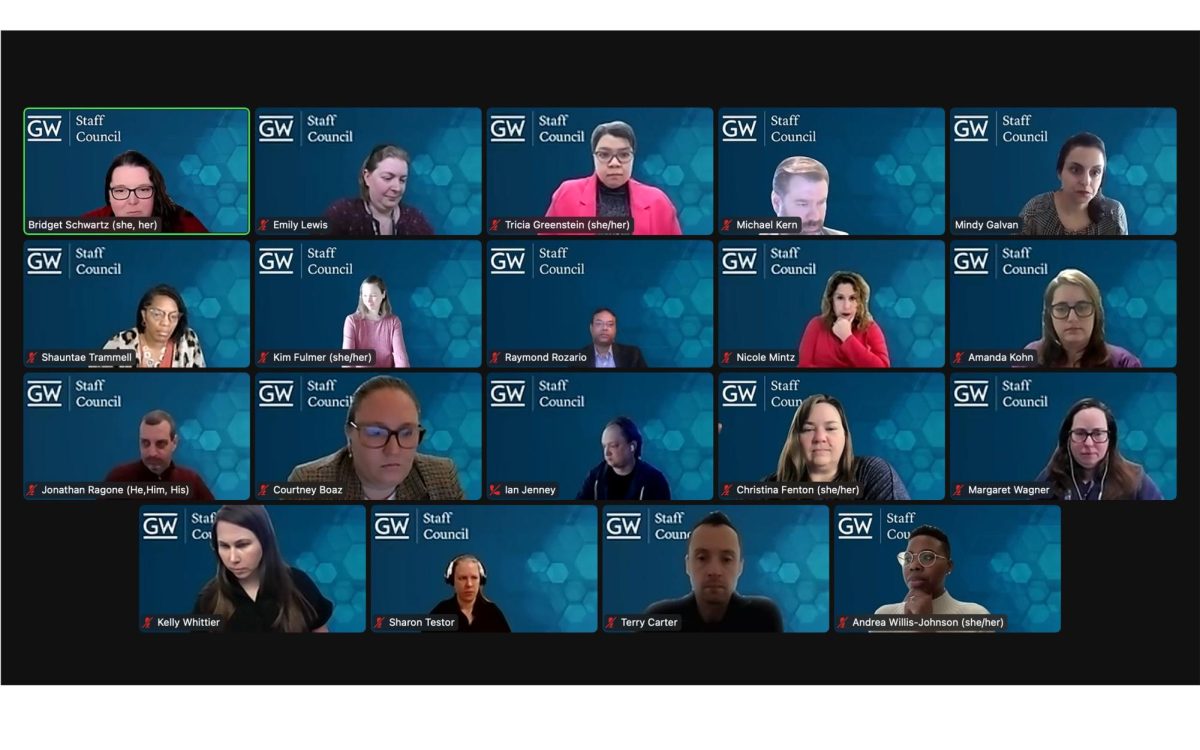Updated: Feb. 25, 2024, at 2:46 p.m.
Staff Council members voted to amend council bylaws and shift the start and end dates of representatives’ terms at a council meeting last week.
Historian Andrea Willis-Johnson said councilmembers previously assumed duty from July 1 to June 30 in accordance with the fiscal year, but the Ad Hoc Bylaw Committee suggested changing the term start and end dates to Jan. 1 and Dec. 31 to align with the calendar year. Staff Council President Bridget Schwartz said current councilmembers would serve an 18-month term due to the revised end date of the term.
“The inaugural council will serve its term and any additional time that would make up an entire year of a term,” Schwartz said at the meeting. “Essentially, we would extend our term until December.”
The council also voted to disband the Communications Committee and create a correspondence and engagement secretary role to assume an elected officer position. Willis-Johnson said the council elected Amanda Kohn, the former chair of the council’s Communications Committee, to fill the role.
“Amanda’s leadership, technological skills, her work on the web platforms, coordination with senior level folks and just the work on projects that have high visibility and taking ownership over those projects, in an incredible way helped our executive officer team realize the importance of having a position within the executive officer ranks that oversees the communications of the council to the GW law community,” Willis-Johnson said.
Councilmembers voted to delegate the power to oversee bylaw amendments, repeals or alternations between the historian, parliamentarian and other executive officers after noticing an undefined “administrator” role in the bylaws.
“This reference was an error in the first iteration of our bylaws and was created when consulting other templates and drafting,” Willis-Johnson said.
The council voted to change the councilmember nomination period from annually in May to April through August and to change the two-week election period to take place from the end of September to October.
Michael Kern, the representative for GW Information Technology, said the two-month nomination period should be between September and October because August and September may be too busy for staff.
“Voting between August and September, I don’t know if that’s the best time to vote. The focus is overwhelmingly on preparing for the start of school,” Kern said. “I don’t think the focus of staff should be on voting for Staff Council during this time.”
Nicole Mintz, the chair of the Staff Experience Committee, introduced a resolution asking officials to permanently adopt GW’s remote and hybrid policy, which renews every year starting in March. D.C. Mayor Muriel Bowser prohibited city employees from working remotely for more than one day per week in January.
Employees who work remote or hybrid positions are required to fill out an agreement every academic year in which staff indicate which days of the week they will telework. Officials support telework due to ties to reducing vehicle emissions and improving staff retention, according to the Human Resource Management and Development website.
Kelly Whittier, the representative for the Milken Institute School of Public Health, said staff benefit from GW’s telework policy, which supports remote or hybrid work to promote a work-life balance.
“This is one of those types of nonmonetary benefits that could truly help GW retain talent and not sort of drive folks to other options that are more flexible,” Whittier said.
The resolution states that GW should not cut down the amount of days a GW employee can work remotely because increasing in person work day requirements will damage staff morale and may lead to staff members leaving the University. Councilmembers voted to remove a clause in the resolution that stated that GW staff compensation does not keep up with the cost of living in the District, Maryland and Virginia because it may suggest that teleworking is an alternative to compensation accommodations to the cost of living.
Staff Council Vice President Kim Fulmer said the Staff Development and Recognition Committee is working on reviving awards for GW staff. She said the committee would like staff from each division to have an “excellence award.”
Kohn said she has put “micro surveys” in the Staff Council’s monthly newsletter to gather feedback on various topics. She said the most recent survey was on staff commutes, which found that 56 percent of staff have a commute of 41 minutes or more and 84 percent of staff are working in person three or more days per week.
She said staff who took the survey said they would like subsidies for parking or using the Metro.
“I want to reiterate we do use these surveys to better understand our staff,” Kohn said. “It’s a good temperature gauge and it guides our initiatives moving forward as a council.”
Ianne Salvosa contributed reporting.
This post was updated to correct the following:
The Hatchet incorrectly reported that Amanda Kohn would assume the correspondent and engagement secretary role. She was elected to fill the correspondence and engagement secretary role. We regret these errors.





